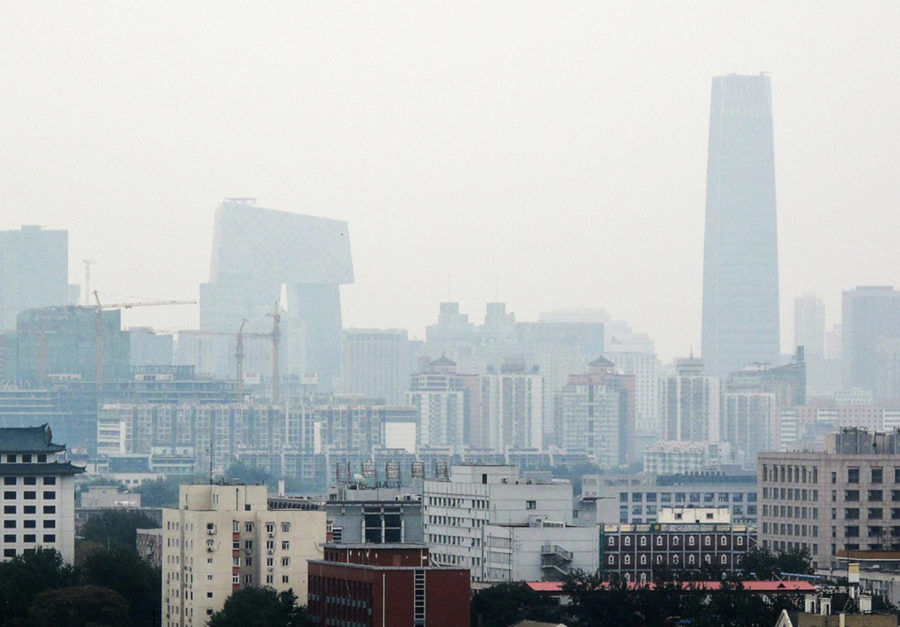Gross: Pollution is a global problem
Courtesy: Francisco Anzola/Flickr
Beijing is one of many Chinese cities that deal with major air pollution.
December 9, 2013
Visitors to the Chinese city of Shanghai may not be able to see the buildings looming half a mile in front of them, but they may see countless residents streaming past them with air-filtering masks adorning their faces. In the first week of December, flights were delayed, workdays cancelled and children were forced indoors as a result of dangerous levels of pollution.
The pollution in China’s major cities is by no means breaking news, but pollution levels in Shanghai have no gotten so bad that they are literally off the chart. A chart on the Shanghai’s government’s monitoring website displays various levels of air pollution and their potential danger to those who breathe the air. On Dec. 6, a reading taken in the city produced a level of 503, which goes beyond what Shanghai’s index even predicts. For some perspective, levels of about 300 are considered severely harmful to a person’s health and in fact, levels above 20 are not recommended by the World Health Organization.
Until recently, China had notoriously bad air pollution and emissions regulations, leading to undue smog and pollutants filling the air. Chemical plants and factories belch foulness into the air at all hours of the day, and until the last few years, all this went unhindered. Growing protests from environmentalists and even common citizens struggling with breathing problems led to action. In June of this year, China enacted a number of new air quality measures to decrease factory emissions across the entire country. Unfortunately, these new laws (and the growing severity of their punishments) may be too little, too late.
As China continues to grow at an alarming rate, cutting back emissions will do little in the grander scheme. A goal set by the Chinese cabinet is for each unit of economic output to produce 30 percent less polluting emissions by 2017. An article by the New York Times points out that this may not be enough: “if the economy grows 7 percent or more a year, as forecast, the decrease in total pollution will be modest.” Even that estimation is modest, as China’s economic growth has been between 8 and 14 percent since 2001.
It’s easy to disregard this information, categorizing high pollution rates as “China’s problem.” Unfortunately, despite being separated by vast geographical distance, it is in the end the same air that we breathe. It may be Shanghai citizens that are wearing the air-filtering masks today, but tomorrow, next month, next year, it could be us. Reports of China’s pollution affecting the United States are seen more and more frequently with each passing year. A report by Discover magazine illuminates the dangers of China’s pollution, stating that China now pushes more mercury into the atmosphere than Europe, the US and India all combined. Due to the extreme rate of expansion and development in China, the pollution has gotten completely out of control.
Problems caused by these emissions are not limited to global warming, abnormal weather or the melting ice caps. We can expect that these levels of pollution will produce more immediate outcomes within our own generation. The list of problems that chemical pollutants cause is longer than can be listed in this column. It includes prenatal brain development problems, asthma, emphysema, and forms of cancer. The mercury in the air is the biggest problem, and some evidence seems to state that this level of mercurial exposure can cause Alzheimer’s and Parkinson’s diseases – not a fate that anyone wants.
When the consequences are decades or even centuries away, as is commonly thought of global warming, we feel comfortable leaving the solution to the next generation. However, it is our generation who will be struck with the health problems that result from air pollution. We will be the ones with lung cancer, severe asthma, or even dementia as the years pass because we didn’t step in.
Obviously there is no direct way we can influence the government of China’s decision. However, they’ve shown that they are not unwilling to work against pollution, and we need to make sure that continues. Don’t assume that factories in Asia don’t affect you, they do. We must speak, loudly, to enact the necessary change and save, if not our future generations, at least ourselves.
There are countless distances and differences between China and the US – geographical, lingual, cultural – but we share one atmosphere. Pollution-related illnesses and disease will affect us, not our grandchildren or their grandchildren. Maybe the onset of these illnesses will spur action, as well they should.
As stated by atmospheric chemist Dan Jaffe in Discover magazine’s article, “There is no Planet B. We all live downwind.”







